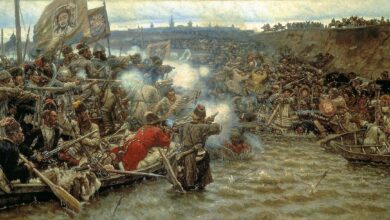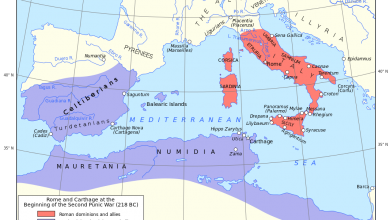A Stake in the Continent: why Great Britain Fought in the World Wars

What motivated the United Kingdom to fight in the World Wars? This is question that is frequently asked when discussing the British participation in these conflicts – the First World War in particular. It’s also a reasonable question. Great Britain sat back even as France and Prussia tore at each other in the Franco-Prussian War. Why then did they decide to firmly plant their flag with Paris not even fifty years later?
Great Britain and the Splendid Aberration
The puzzle becomes considerably less mysterious if one focuses on the security policies of the UK during its history. For Great Britain, its decision then to join the Entente actually aligns perfectly with a policy pursued since the days of Henry VII. In actuality, the irony is that Britain’s Splendid Isolation in the second half of the 19th century was the aberration – the anomaly. British intervention in Continental affairs was actually meant to be the norm.
The lack of British intervention in the Austro-Sardinian War of 1859 was possibly compelled by fears of a French invasion. Less than a decade later, Britain would successfully assert its interests against those of France and Prussia during the 1867 Luxembourg Crisis. The crisis started with France attempting to purchase the Grand Duchy from the Dutch, igniting Prussian agitation at the threat to their rights in the area.
The subsequent conference in London denied both Paris and Berlin control of the region, guaranteeing the perpetuation of the personal union between the Grand Duchy of Luxembourg and the Kingdom of the Netherlands. It also led to the demolishing of the great fortifications of Luxembourg, which had long been important and famous, earning Luxembourg the nickname “Gibraltar of the North”. Further, it compelled all the major powers to guarantee Luxembourg’s neutrality, even forcing a reluctant Prussia to withdraw her garrison from the Duchy, which had been a Prussian right ever since the Congress of Vienna. And so, merely with diplomacy, and backed by the threat of force, London managed to neutralise the crisis and win enforcement of the 1839 Treaty of London.

Likewise, the absence of British soldiers from the battlefields of the Franco-Prussian War does not equal to a retreat from the matter: on the contrary, Whitehall took actions to preserve the balance of power on the Continent. In 1870, the British threw their weight into the brewing conflict by demanding separate treaties from France and from Prussia, reaffirming their guarantee of Belgian neutrality as contained in the Treaty of London 1839. This further forced both sides to renounce all claims to the Belgian territory. Thus, merely by putting her foot down, Great Britain cowed Paris and Berlin into compliance. Accordingly, the German assault came via the Rhine and Moselle, rather than through Belgium.
Due to these diplomatic successes, Great Britain did not need to intervene militarily nor did it desire to. However, this did not represent disentanglement: London never left the Continental powers to do as they pleased. On the other hand, it made it abundantly clear that if either power violated Belgian neutrality, it would march to war on Belgium’s behalf. The two sides were wise enough to recognise this and to not risk British hostility. Great Britain also repeatedly sent fleets into the Turkish Straits in support of the Ottoman Empire against Russia, going so far as to prepare troops to land in Constantinople to repel the Russians in 1878. This also led to a concession by Russia to Britain’s wishes at the Congress of Berlin.
From this, the conclusion is even during the so-called Splendid Isolation, Britain did not act like an isolated country. It asserted its rights with the threat of force, and this was enough to compel conformity to its wishes. A quote that perfectly encapsulates British policy at the time can be found in a letter written in 1749, sent by the Duke of Newcastle to Lord Hardwicke: “France will outdo us at sea when they have nothing to fear by land. I have always maintained that our marine should protect our alliances upon the continent; and thus, by diverting the expense of France, enable us to maintain our superiority at sea.”.
Security Guarantees
Another excellent quote comes from historian Cyril Falls: “Yet too many British historians and self-styled experts in strategy have, especially when dealing with this war [First World War], made preposterous claims for sea power, claims both contrary to common sense and founded on distortion of history. Britain, they say, should not have created a mass conscript army; she should have stood off, kept the seas, and blockaded the enemy. This, they add, was her traditional policy. It may have been the policy she had hankered after in selfish moments, but it had never been pursued for long. Time after time Britain – a country with a small population, and therefore a small army, before the 19th century – had been forced to send land forces to the continent to prevent her allies from collapsing. It was not merely that they might be routed and driven out of the war by sheer force of arms. They might walk out.”
Britain first developed the policy of providing security guarantees to her allies on the Continent in the late 15th century. Henry VII had committed himself to an anti-French alliance with Spain and Austria at the opening of the Italian Wars in the 1490s. This was the beginning of England’s policy of neutralizing the Low Countries and restraining any prospective hegemon, which initially was France and then Spain, following the disintegration of the French Kingdom in the Wars of Religion.
Queen Mary sent troops to help Philip II at St Quentin, Queen Elizabeth sent strong contingents to help the Dutch in their revolt against Spain, and from William III the British committed increasingly powerful forces to the Continent to fight Louis XIV. This was the great age of Marlborough when Britain contributed to such mighty victories as Steinkirk, Oudenarde, Malplaquet, Ramillies, and Blenheim. It saw British redcoats fighting side by side with Austrians in the heart of Germany. Eventually France, first as a reunified kingdom under Richelieu and then as a revolutionary power, emerged once more as Britain’s main antagonist – until Germany took on the mantle in 1871.

The Key to Prosperity: Access to the World’s Oceans
Britain’s access to naval bases the world over allowed an unprecedented ability to project military power. It also gave London an undisputed role steering world trade, something which her European competitors perceived as an undue influence on their ability to obtain economic prosperity. This was acutely felt in Germany, where the great economic and industrial progress of the 19th Century depended primarily on the Reich’s export trade – which in turn depended from Great Britain, as the chief controller of the world’s oceans.
In this light, Britain traded acceptance for its role as a guardian of trade and finance in exchange for military guarantees to her allies. These military guarantees were also designed to keep European powers focused on each other’s antagonism and prevent any of them from achieving a position of dominance on the Continent.
The American political scientist, Nicholas Spykman, observes in America’s Strategy in World Politics: “In times of continental threats to her naval supremacy Great Britain usually deserted her policy of isolation and joined one of the continental combinations. Such a step improved the relative power position, reduced the size of the naval strength to be met, and increased the size of the fleet with which to meet it. A continental ally was helpful in the early stages of a power struggle and absolutely indispensable when war broke out. Only through a land power of the mainland could Britain take a successful offensive against a large continental state. Only with the army of an ally could the land frontier of the opponent be attacked and the type of action developed which, together with the British blockade, might bring victory.”
He also points out that “Great Britain has played an active role in most of the coalitions that have been formed to restrain growing continental powers. In the name of preserving the equilibrium, everybody in Europe has fought everybody else. Britain has successively defeated Spanish, Portuguese, Dutch, French, and German sea power and has successfully used Spain, Portugal, Holland, France, and Prussia as allies. Power politics is responsible for her reluctance to make advance commitments to any nation beyond the buffer zone. He who plays the balance of power can have no permanent friends.”
The Place in the Sun
So it is now understood that the policy of Great Britain has always remained the same. With that in mind, the initial question which was posed can now be answered. “Why did Great Britain get involved in the First World War or the Second World War?”. The answer comes from Robert J. Art:
“In 1914, Germany needed England to stand aside so that it could shore up its failing great power ally Austria-Hungary and deal with the growing power of Russia. Diplomatic isolation for Germany (the dissolution of Austria-Hungary) meant the political encirclement and eventual strangulation of Germany in the eyes of Germany’s leaders. If Britain stood aside while Germany attained continental hegemony, however, then Britain’s security would be at risk if a hegemonic Germany deployed the resources of the European continent against it. So, in classic security dilemma terms, Britain’s security would be at risk from the continental hegemony that Germany believed it needed for its security, and similarly, Germany’s leaders believed that Germany’s security would be at risk if Britain denied it continental hegemony. The same logic applies to the British-German struggle during the 1930s. A Nazi Germany that had defeated Russia and dominated the continent could aggregate its resources and turn them into an invasion force to crush England’s defences. The threat that German hegemony posed on Britain brought on the two World Wars.”
Berlin and London were concerned about the security of their nations and were justified in seeking it. To suggest that England ought to have done nothing while Germany had its way with the continent is to ignore or be ignorant of every major war England has ever fought. England could only perpetuate its supremacy at sea and by extension her very independence by the balance of power on the continent. What scared Great Britain the most about Germany was their aggressive actions against the territory and integrity of France. After the Franco-Prussian War, Berlin merely spirited away with Alsace-Lorraine, a minor province, but after the dismissal of Bismarck, it became obviously clear that the German designs on France did not end there.
The World in Flames
Britain attempted to find common ground with Germany in spite of these frictions, and London found itself completely alone diplomatically after the Boer Wars. England had intended to end that isolation when it realised that it had no allies on the continent and that it faced the two armed camps of Germany/Austria and France/Russia by herself. Determining to join one it opted first for Germany but was rebuffed due to German arrogance and misunderstanding.

Accordingly, it shifted its alignment towards France, and the Entente of 1904 delineated the spheres of interest between the two powers. France recognised and guaranteed England’s possession of Egypt, long a bone of contention between the two, while in turn, England did the same for France in Morocco. Friedrich von Holstein immediately wished to challenge this arrangement by provoking the First Moroccan Crisis which led to the Conference of Algeciras, in which everyone but Austria ruled in France’s favour. Particularly, England supported France. This would eventually lead to Germany’s mistrust and perceived lack of stakes in the system of diplomacy via conference – a major factor in the diplomatic deterioration that would precipitate the war.
Realising this, Germany now hoped to drive a wedge between England and France. The method chosen was Tirpitz’s risk theory. He explicitly stated that the purpose of his fleet was not to challenge England but to make war with Germany so costly for England that it wouldn’t fight. In simple words, it was meant to impose neutrality upon England in case of war between the continental blocs. It post-dated the Moroccan crisis and had little to do with imperial ambitions for which neither Germany or England cared in reality. England was on the verge of signing a treaty for the partition of the Portuguese colonies with Germany, and England had conspicuously not opposed German imperialism in Southwest Africa or other places.
Thus, the friction between Germany and England was due to England’s support of France and England’s refusal to let Germany dominate Europe by threatening war, as it was accustomed to doing by sending ultimatums to both Russia and France. At Algeciras, Germany threatened war with England and England threw it in its face, saying that England wasn’t afraid of Germany and that France and Russia might back down but England never would.
Great Britain understood that German ambitions would never settle for slicing off one territory or imposing their will. They wanted to be completely self-sufficient, and this by extension meant to cripple or destroy all other major powers in Europe, leaving Britain isolated. They hoped that Britain, by some miracle, would leave them alone. It is in connection to these events, however, that Britain’s security guarantees at last failed – at least temporarily.
The British Government, in its haste to disarm after Versailles, forgot the underpinning element of its security strategy in Europe. Winston Churchill made a speech in the House of Commons that condemned the minuscule contribution of the British Expeditionary Force and their efforts in the war saying that it was unacceptable that one ally [France] be expected to do all the dying while the other paid only in treasure. So in 1940, France was given little assistance by Britain. Later, they watched even that little assistance get withdrawn from Dunkirk. They then decided to walk out rather than bleed and die on England’s behalf when she herself would not do the same.
This dark page in the history of the Western Allies would eventually be overturned as Britain, the Commonwealth and the United States reaffirmed their stakes in a European continent free of hemispheric hegemonic powers.





